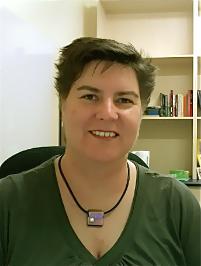CQUni academic says Queenslanders should be worried by CMC Review
Published on 05 Apr, 2013
Media Contact: Please contact (07) 4923 2558 to arrange interviewFor Immediate Release
A Central Queensland academic says Queenslanders should be ‘gravely concerned' about the potential ramifications of the recent Callinan review into the State's Crime and Misconduct Commission.
Fitzgerald Inquiry expert and CQUniversity lecturer, Celeste Lawson, said the recommendations currently being considered by the State Government, could leave the public oblivious to serious cases of potential high level corruption.

Celeste Lawson - LINK for larger image
Click here to View/Download full-sized Image
"With a history of high profile corruption amongst Queensland police and Queensland politicians, people have a right to know who is being investigated in order to make informed voting choices," Ms Lawson said.
A total of 17 recommendations were provided to the State Government about the CMC after a review by former High Court Judge Ian Callinan.
Mrs Lawson, whose research expertise includes the period of the Fitzgerald Inquiry into police corruption in Queensland, said Queenslanders should be most concerned about two of the key recommendations.
"The first prohibits media publication of details of CMC investigations until after a case is finalised. The second charging people who make vexatious complaints to the CMC," she said.
"Both of these concepts have the potential to either place a veil of secrecy over serious cases of corruption; or deter genuine whistleblowers from lodging complaints because they fear retribution."
While Ms Lawson acknowledged the media could sometimes go too far in vilifying people facing investigation, she believed the recommendations might go against the spirit of the Fitzgerald legacy.
"Queenslanders should not forget that police and political corruption was rife in 1987 at the time of the Fitzgerald Inquiry.
"This is why the CMC (formerly Criminal Justice Commission) was established in the first place. The public at that time had a right to know that our top police and government ministers were involved in potential corruption.
"Twenty-five years on, the public's right to be informed remains unchanged. It is about accountability. Of course there are exceptions, but people have a right to know that important public figures are linked to corruption allegations.
"Unfortunately, vexatious claims against public figures are often made by political parties for political gain.
"However, the new recommendations to charge informants for baseless allegations will only serve to deter genuine whistleblowers from coming forward.
"Back in his time, Tony Fitzgerald wanted whistleblowers to be able to come forward without fear of persecution," she said.
"We have seen cases where politicians have used the CMC process as smear campaigns against other candidates. That is a serious issue. But if genuine whistleblowers are frightened to speak up, potential corruption may never be identified.
"Likewise, without the ability of the media to report on investigations, serious matters of public concern would never come to light."
"It's this balance of public accountability that the CMC was developed to provide.
"Most court cases are open to the public on which the media can report. It's ludicrous to place a blanket media ban on all matters before the CMC."
Ms Lawson made it clear that she was not defending recent actions by the CMC, but was highlighting the underlying principles of the watch dog body.
"They have made mistakes, but the principles under which the CMC were established should be upheld.
"Without broader freedom of the media to report the names of those under investigation - provided it's in the public interest - there's a real risk of a potential cover up and a lack of accountability over all.
"The media must behave ethically. They should not vilify those accused or whistleblowers, but it is also unacceptable for allegations against high profile people, who are accountable to the public, to be hidden in a shroud of secrecy."
ENDS

